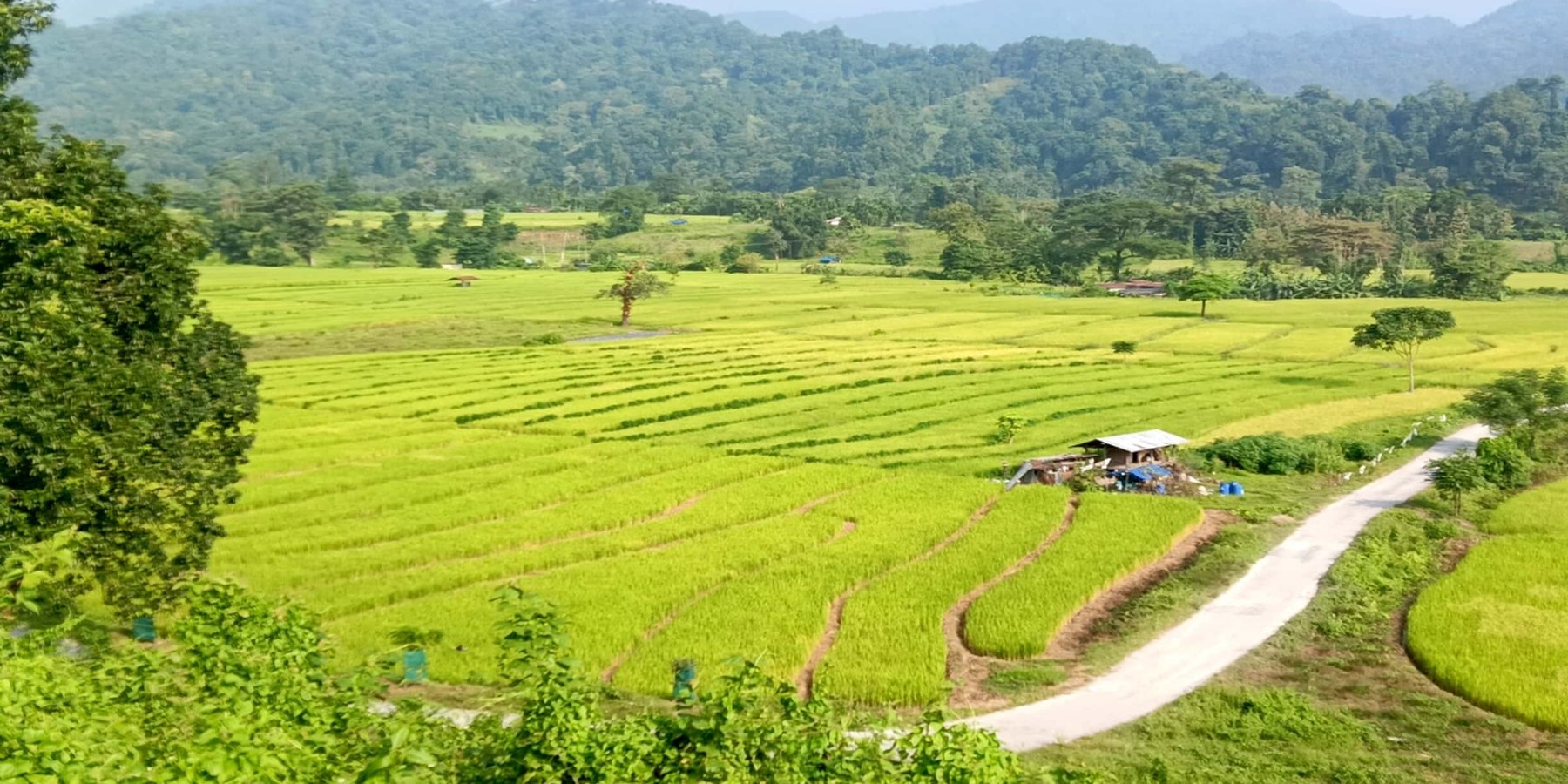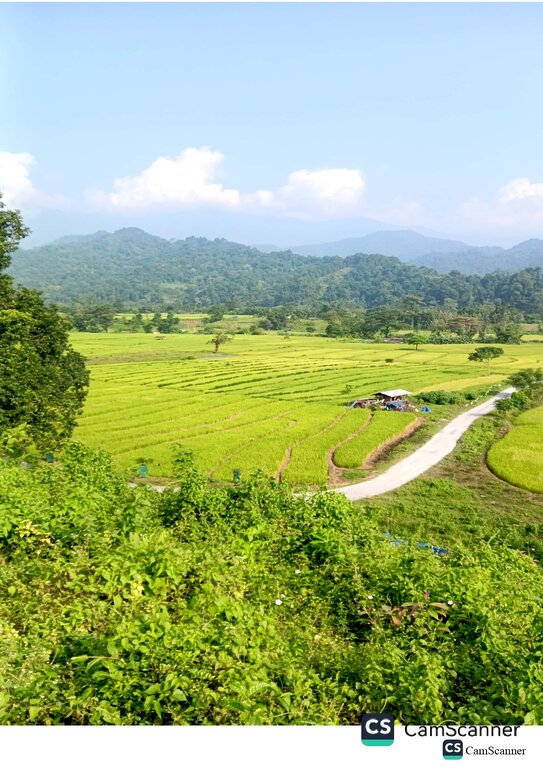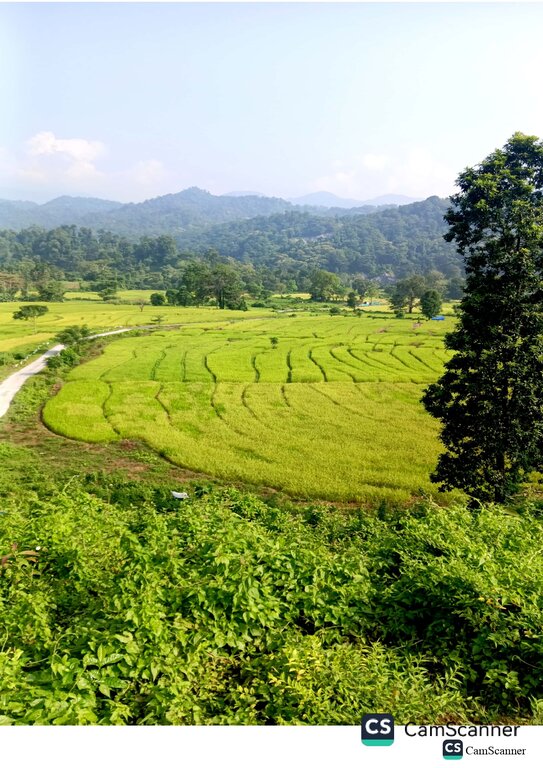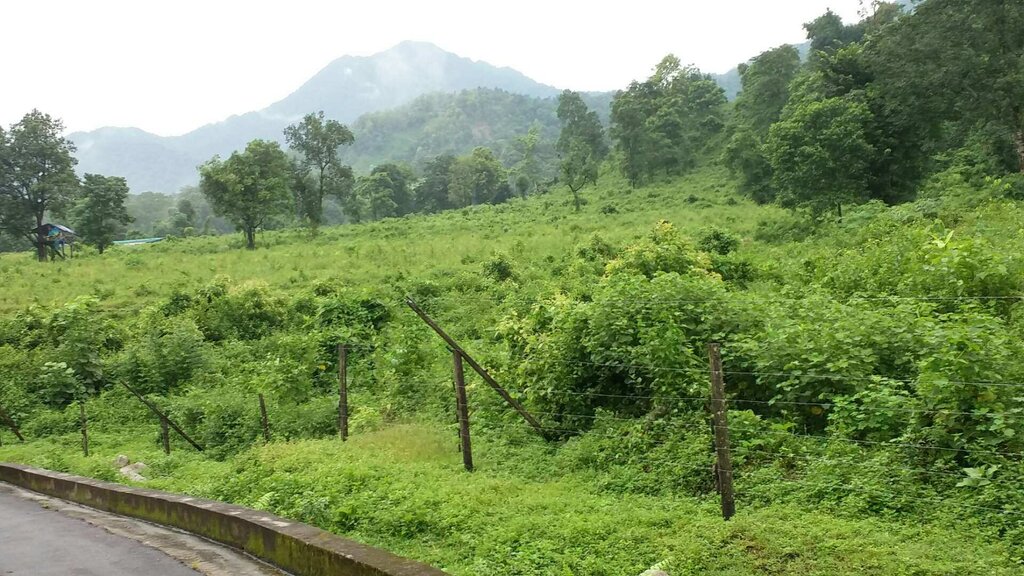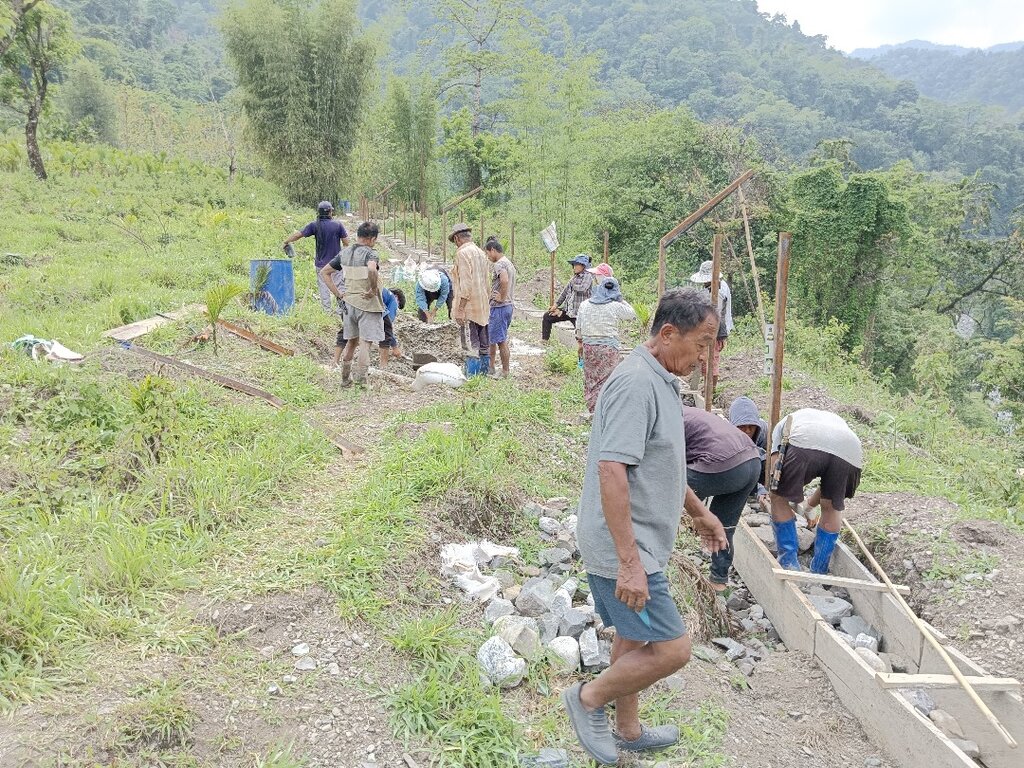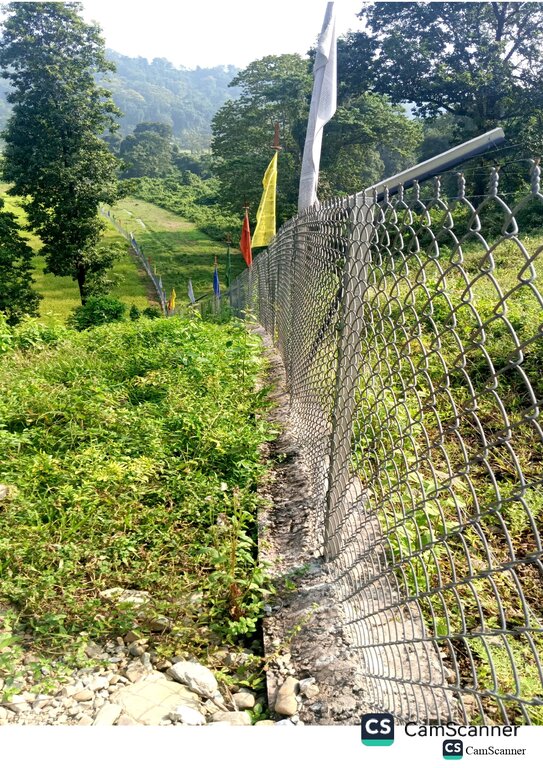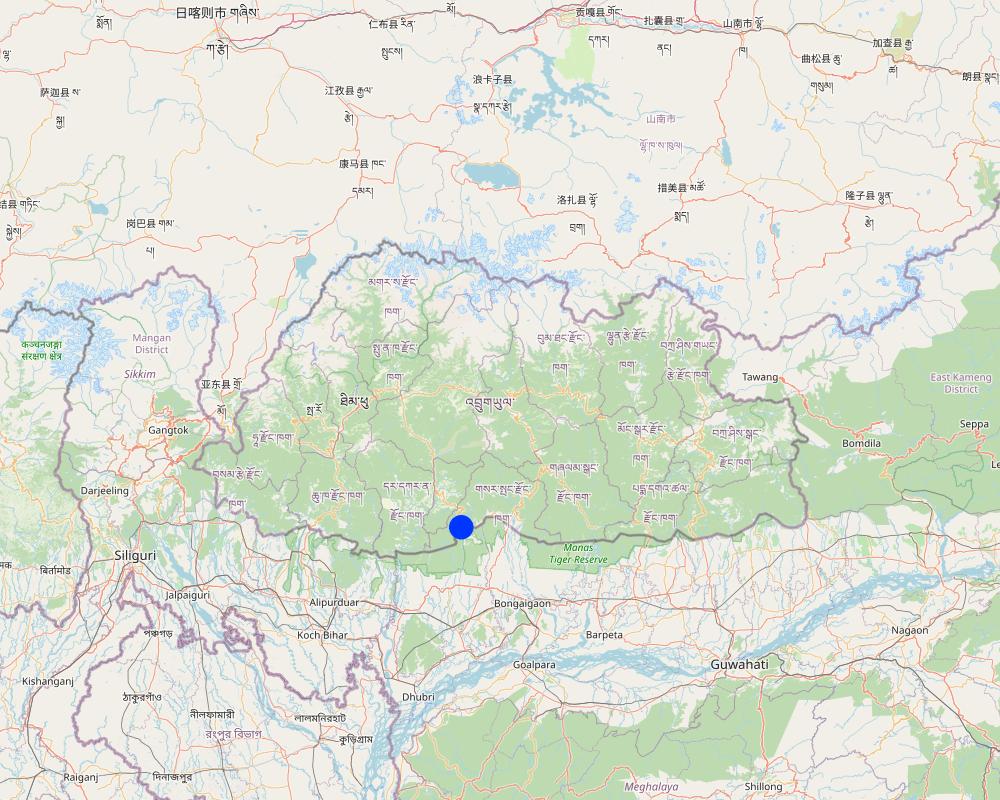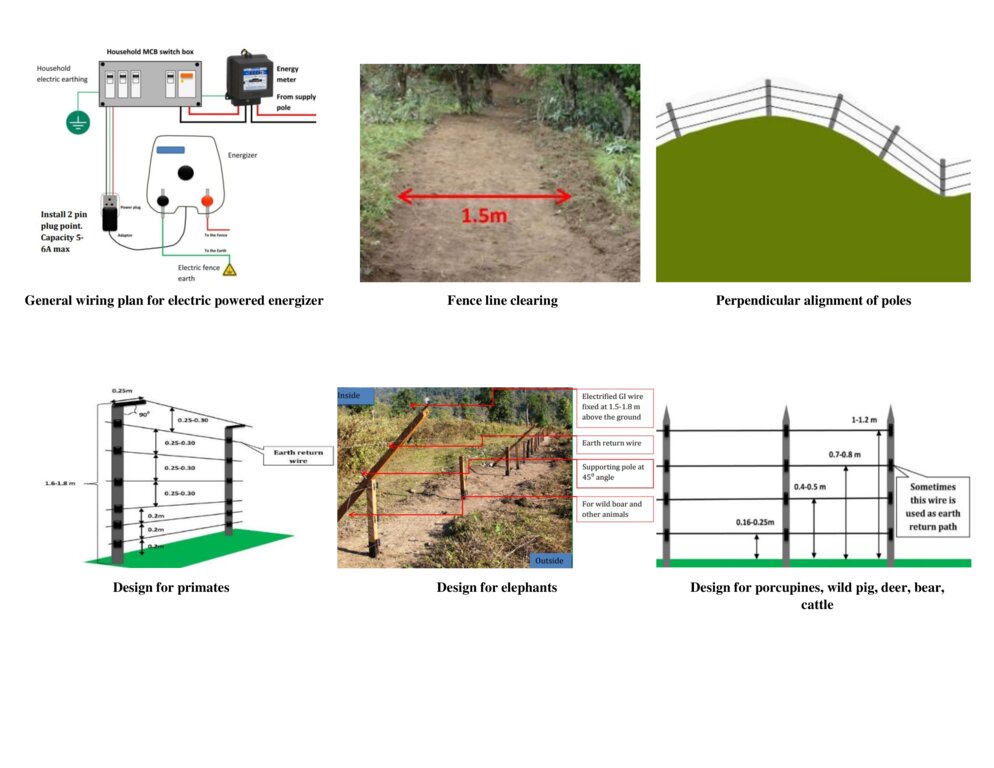Securing Food Through Electric Fencing [Бутан]
- Шинийг нээх:
- Шинэчлэх:
- Эмхэтгэгч: Nima Dolma Tamang
- Хянан тохиолдуулагч: Chenga Tshering
- Хянагчид: William Critchley, Rima Mekdaschi Studer, Joana Eichenberger
Logmey Raw Ley Ten Za Thung Sung Chop (གློག་མེ་རཝ་ལས་བརྟེན་ཟ་འཐུང་སྲུང་སྐྱོབ།)
technologies_6830 - Бутан
Бүлгүүдийг үзэх
Бүгдийг дэлгэх Бүгдийг хаах1. Ерөнхий мэдээлэл
1.2 Технологийг үнэлэх, баримтжуулах ажилд хамаарах мэдээлэл өгсөн хүмүүс, байгууллагуудын холбоо барих мэдээлэл
Мэдээлэл өгсөн хүн (с)
Газар ашиглагч:
Tashi Tshering
Бутан
Gewog Agriculture Extension Officer:
Wangdi Thinley
Gewog Agriculture office, Senggye Gewog, Sarpang Dzongkhag
Бутан
Технологи баримтжуулах/үнэлэх ажилд дэмжлэг үзүүлсэн төслийн нэр (шаардлагатай бол)
Strengthening national-level institutional and professional capacities of country Parties towards enhanced UNCCD monitoring and reporting – GEF 7 EA Umbrella II (GEF 7 UNCCD Enabling Activities_Umbrella II)Технологи баримтжуулах/үнэлэх ажилд дэмжлэг үзүүлсэн байгууллага(ууд)-ын нэр (шаардлагатай бол)
National Soil Services Centre, Department of Agriculture, Ministry of Agriculture & Livestock (NSSC) - Бутан1.3 ВОКАТ-аар баримтжуулсан өгөгдлийг ашиглахтай холбоотой нөхцөл
Эмхэтгэгч болон гол мэдээлэгч хүн(хүмүүс) WOCAT аргачлалаар баримтжуулсан мэдээллийг ашиглахтай холбоотой нөхцлийг хүлээн зөвшөөрсөн:
Тийм
1.4 Технологи тогтвортой гэдгийг баталгаажуулах
Энэ технологийг газрын доройтлыг бууруулж, газрын тогтвортой менежментийг хангахад тохиромжтой гэж үзэж болох уу?
Үгүй
Тайлбар:
Based on the responses provided by the interviewee (Group Chairman), it appears that electric fences may not directly contribute to mitigating land degradation. However, they can be considered as part of a technological approach, particularly in terms of adaptation, given their effectiveness in land restoration, fallow land reversion, ensuring food security, and ultimately enhancing livelihoods.
2. ГТМ Технологийн тодорхойлолт
2.1 Технологийн товч тодорхойлолт
Технологийн тодорхойлолт:
The Electric Fencing System in Bhutan serves as a non-lethal approach to safeguarding crops from wild animals, aligning with the principles of Gross National Happiness (GNH). GNH emphasizes values such as compassion, non-killing, and harmonious coexistence with nature and its elements.
2.2 Технологийн дэлгэрэнгүй тодорхойлолт
Тодорхойлолт:
The Electric Fencing System in Bhutan serves as a non-lethal approach to safeguarding crops from wild animals, aligning with the principles of Gross National Happiness (GNH). GNH emphasizes values such as compassion, non-killing, and harmonious coexistence with nature.
The National Plant Protection Centre (NPPC), Department of Agriculture (DoA), Ministry of Agriculture and Livestock (MoAL) has been facilitating the application and installation of electric fence systems nationwide. This is achieved through the provision of comprehensive guidelines to help the public comprehend the fundamental components and installation procedures.
In essence, the electric fence system consists of three major parts: Energizers, Insulators, and Earth return. The energizer is responsible for generating high-voltage pulse electricity (ranging from 9-12 KV), which is then delivered along the fence wires. The majority of energizers are directly connected to the electricity line, while in some isolated cases, solar panels and batteries are used as alternative power sources. Insulators are typically crafted from a non-conductive material and serve as a barrier between the electrified wire and the wooden post. In the Bhutanese market, these insulators are not readily available, thus as an alternative, high-density polyethylene (HDPE) pipe has been found to be effective and cheap. The electric fence earth return serves as an essential pathway in the electric circuit, collecting high voltage and current from the earth and returning it to the energizer.
The loss of crops to wild animals leads to increased production costs in Bhutan (time spent in crop guarding) and the expansion of fallow lands. Farmers often resort to illegal and fatal methods of electric fencing, tapping electricity directly from the main line. To address these issues, the implementation of electric fencing, utilizing imported IEC-certified energizers and locally fabricated fencing materials, has proven to be successful. This electric fencing system, introduced after five years of pre-testing across the country, covers various locations targeting different problem species of animals. Not only is this technology effective in controlling wild pests, but it also enjoys high social acceptance among Bhutanese farmers due to its cost-effectiveness and being non-lethal to wild pests.
A recent study on the impact of electric fencing on food security focused on the Laptsakha community in Senggye Gewog, Sarpang Dzongkhag. They faced threats to food security from elephants, boar and stray cattle from neighboring communities in India. Crop production in Laptsakha was negligible before the introduction of electric fencing: resettled households contemplated returning, fertile lands were left fallow, and incomes shrank. The turning point came in 2013 with the introduction of electric fencing. This intervention successfully mitigated wildlife attacks on crops, ensuring food security and contributing to a harmonious ecosystem and improved livelihoods for the people of Laptsakha.
The electric fence, covering a distance of 7 km, protects a total of 60 households in all, safeguarding about 60 (24 ha) acres of vulnerable lands. Electric fences have various benefits including:
•Harmonious Approach: they do not cause harm to animals beyond a repellent shock.
•Economical and Easy to Build: they are cost-effective and relatively easy to construct.
•Learning and Deterrence: animals quickly learn to respect electric fences.
•Durability: they have an extended service life.
•Versatility: they offer a variety of designs and can control a wide range of wild animals.
The installation of an electric fence involves a participatory approach and several key steps:
•Location and Length: determine the location and approximate length of the electric fence either by manual measurement, or remote technologies for larger expanses.
•Material Estimation: estimate the required materials per kilometre based on the identified area, including wooden poles, HDPE pipe, and GI wire.
•Additional Materials: Consider other essential materials like energizers, solar panels, charge controllers, and batteries, depending on the specific requirements.
•Cost Estimation: Calculate the cost of installation, which varies regionally. For example, to instal one kilometre of an electric fence is estimated at about Nu. 7,450 (USD 95) excluding labour costs and cost of wooden poles which is sourced locally.
The implementation of electric fencing in the community has brought significant advantages, particularly in securing food. Prior to this intervention, the community faced severe challenges in harvesting crops, with approximately 70% of fertile lands being left fallow due to constant human-wildlife conflicts. Crop guarding became routine & risky.
With the introduction of electric fences, the community's agricultural landscape has undergone a positive transformation. Crop diversification has been enhanced, encompassing maize, ginger, paddy, mandarin fruit trees and areca nut. The frequency of wild elephant attacks has significantly decreased, leading to a notable increase in crop production. This has resulted in secured food sources and improved livelihoods. Additionally, the community has successfully revived previously fallow lands.
While the electric fencing has proven effective, there are challenges faced by the land users, notably the frequent damage to energizers, primarily attributed to thunderstorms. This has resulted in higher maintenance costs. In one specific instance, the community had to mobilize approximately Nu. 145,000 (USD 1800) independently to replace damaged energizers and other materials, supplementing the continued support from the government.
2.3 Технологийн гэрэл зураг
2.5 Энэ үнэлгээнд хамрагдсан технологийг хэрэгжүүлсэн улс орон/ бүс нутаг/ байршил
Улс:
Бутан
Улс/аймаг/сум:
Sarpang Dzongkhag
Байршлын дэлгэрэнгүй тодорхойлолт:
Laptsakha Village, Senggye Gewog
Технологи өргөн дэлгэрсэн эсхийг тодорхойл:
- тодорхой газар хэрэгжсэн/ жижиг талбайд төвлөрсөн
Технологи(иуд) нэвтрүүлсэн талбай тусгай хамгаалалттай газар нутагт байрладаг уу?
Тийм
Хэрэв тийм бол, тодруулна уу:
The Laptsakha community (electric fencing site) falls under Phibsoo Wildlife Sanctuary.
Тайлбар:
The Phibsoo Wildlife Sanctuary, situated in western Sarpang Dzongkhag and south-eastern Dagana Dzongkhag along the border with West Bengal, is the second-smallest national park in Bhutan, covering an area of 268.93 square kilometers. This sanctuary is linked to Jigme Singye Wangchuck National Park and Royal Manas National Park through a biological corridor that crosses a national highway. The elevations within the sanctuary range from 200 meters to 1,600 meters.
Map
×2.6 Хэрэгжсэн хугацаа
Хэрэгжүүлсэн он:
2013
2.7 Технологийн танилцуулга
Технологийг хэрхэн нэвтрүүлснийг тодорхойл:
- Гадны төсөл/хөтөлбөрийн дэмжлэгтэйгээр
Тайлбар (төслийн төрөл г.м.):
The electric fencing program in the community was facilitated by the former Renewable Natural Resources and Development Centre (RNR-DC) - Yusipang, now known as the National Center for Organic Agriculture- Yusipang. Additionally, the expertise of the electric fence specialist from ARDC - Wengkhar, Mongar (Eastern Bhutan) was involved in the implementation of the program.
3. ГТМ технологийн ангилал
3.1 Технологийн үндсэн зорилго (ууд)
- үйлдвэрлэлийг сайжруулах
- газрын доройтлыг бууруулах, сэргийлэх, нөхөн сэргээх
- биологийн төрөл зүйлийг хамгаалах / сайжруулах
- үр ашигтай эдийн засгийн нөлөөг бий болгох
- нийгэмд үзүүлэх үр нөлөөг бий болгох
3.2 Технологи нэвтрүүлсэн газрын одоогийн газар ашиглалтын хэлбэр(үүд)
Нэг газр нутгийн хэмжээнд хэрэгжих холимог газар ашиглалт:
Тийм
Газар ашиглалтын холимог тогтолцоог (тарилан/бэлчээр/ой мод) тодорхойл:
- ХАА-н ойжуулалт

Тариалангийн талбай
- Нэг наст үр тариа
- Олон наст (модлог биш) үр тариа
Нэг наст үр тариа - Таримлыг тодорхойлно уу:
- үр тариа - эрдэнэ шиш
- үр тариа - шар будаа
- үр тариа - цагаан будаа (чийгт газрын)
Олон наст (модлог биш) тариалан - Таримлыг тодорхойлно уу:
- арек
- ханборгоцой
- Banana, cardamom
Жилд ургамал ургах улирлын тоо:
- 2
Тодорхойлно уу:
Maize in summer is followed by chilli in winter.
Сөөлжлөн тариалалт хийгддэг үү?
Тийм
Хэрэв тийм бол ямар таримлыг сөөлжлөн тариалдаг вэ?
The people of Laptsakha cultivate paddy (wetland) and soybean simultaneously. The soybean is grown along the terrace bunds, especially as a border crop.
Таримлыг ээлжлэн тариалдаг уу?
Тийм
Хэрэв тийм бол, тодруулна уу:
The maize harvest is followed by chilli cultivation

Байгалийн ой / модтой газар
- (Таримал) байгалийн ой/мод бүхий газар
(Сэргээсэн)байгалийн ой/тармаг ойд: Менежментийн төрлийг тодорхойлно уу:
- Сонгомол огтлол
- Ойн дагалт баялаг ашиглах
(Сайжруулсан)байгалийн ойн төрөл:
- субтропикийн чийглэг ойн ургамалжилт
- Mixed broad leaves
Дээр дурьдсан модны төрөл навч, шилмүүсээ гөвдөг үү эсвэл мөнх ногоон уу?
- холимог навч, шилмүүсээ гөвдөг/мөнх ногоон
Бүтээгдэхүүн ба үйлчилгээ:
- Мод бэлтгэл
- Түлшний мод
- Бэлчээрийн талбай/Хариулгатай бэлчээрлэлт
3.3 Технологи хэрэгжүүлснээр газар ашиглалтад өөрчлөлт гарсан уу?
Технологи хэрэгжүүлснээр газар ашиглалтад өөрчлөлт гарсан уу?
- Үгүй (3.4 руу шилжинэ үү)
Тайлбар:
The introduction of electric fencing in the community has not led to a change in land use patterns. However, there has been a notable transformation in land cover over the years. Prior to the implementation of electric fencing, approximately 70% of the currently cultivated lands (comprising 325 acres, including 168 acres of dry land and 157 acres of wetland) were left fallow due to the threat of wildlife (human-wildlife conflict). The introduction of electric fencing has played a crucial role in revitalizing these fertile fallow lands, bringing them back into cultivation.
3.4 Усан хангамж
Технологи хэрэгжүүлсэн газрын усан хангамж:
- Байгалийн/усалгаатай арга хосолсон
Тайлбар:
The community is well-equipped with two full-time irrigation sources: Mahajan Irrigation and Ghantay Irrigation canals. However, the reliance on irrigation is reduced when there is sufficient rainfall. Therefore, they describe the irrigation system as a mixed approach, combining both irrigation sources and rainwater.
3.5 Технологи ГТМ-ийн аль бүлэгт хамаарах вэ
- Байгалийн ба сайжруулсан ойн менежмент
- Хортон ба өвчний нэгдсэн менежмент (органик газар тариаланг хамруулна)
- Ус намгархаг газрын хамгаалал / менежмент
3.6 Технологийг бүрдүүлэх ГТМ арга хэмжээ
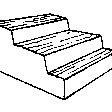
Барилга байгууламжийн арга хэмжээ
- S6: Хашаа, саад, явган хашлага, хашаа
- S10: Эрчим хүчний хэмнэлтийн арга хэмжээ
Тайлбар:
The electric fence can be a structural measure that ensures energy savings due to its versatility (solar and electric-power options). It can be also considered as one of the structural measures ensuring a harmonious environment.
3.7 Технологид харгалзах газрын доройтлын төрөл
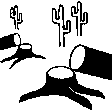
биологийн доройтол
- Bc: Ургамлан нөмрөг багасах
- Bh: Амьдрах орчин доройтох
- Bq: биомасс буурах
Тайлбар:
The electric fencing ensures harmonious environment for wild life. Their lives are prevented from fatal threats being attempted by farmers in controlling wild pests. Hence, they are dedicated with the safe habitats, which ultimately results in enhanced bio-diversity.
3.8 Газрын доройтлоос урьдчилан сэргийлэх, сааруулах ба нөхөн сэргээх
Газрын доройтолтой холбоотойгоор Технологи ямар зорилго тавьсан болохыг тодорхойл:
- газрын доройтлоос урьдчилан сэргийлэх
- Газрын доройтлыг бууруулах
Тайлбар:
The electric fence plays an important role in preventing and reducing land degradation. The lands encompassed within the electric fence are well managed and put to good use (higher ground coverage with year-round cultivation, proper nutrient management, and others). Caring for these productive lands encircled by electric fencing thereby either prevents or reduces land degradation ultimately.
4. Техникийн нөхцөл, хэрэгжүүлсэн үйл ажиллагаа, материал ба зардал
4.1 Технологийн техник зураг
Техник тодорхойлолт (техник зургийн тайлбар):
Insulators are prepared using HDPE pipes (32 mm or 25 mm in diameter, with a pressure capacity of 10 kg/cm2). These pipes are cut into 10-11 cm lengths, with holes drilled at the center, and then secured with two 3-inch nails at both ends, maintaining a 1.50 cm distance from edges. The fencing process involves clearing a fence line with a width of at least 1.5 m. Wooden poles (10 to 18 cm in diameter) are erected perpendicular to the ground, spaced 2.5 to 3 m apart in flat lands and 2 m or less in sloped areas.
For fences designed to control smaller species like rabbits and porcupines, the first wire is positioned about 0.14 to 0.16 m from the ground. Fences for larger animals such as wild boars, deer, and bears require 3 to 4 strands of wires positioned at 0.25, 0.4 to 0.5, 0.7 to 0.8, and 1 to 1.2 m from the ground. In the case of elephants, one or two strands of wire should be positioned at 1.5 to 1.8 m from the ground, and supporting poles should be erected at 45-degree angles from the entrance side of the field.
The height of the fence is adapted based on the target animals, such as monkeys. Typically, the 7th strand is supported on a 25 cm HDPE pipe fixed on top of the wooden pole at a 90-degree angle to the entrance side of the field. This design prevents monkeys from climbing the wooden posts and jumping into the field.
Зохиогч:
National Plant Protection Centre (NPPC), DoA, MoAL
Он, сар, өдөр:
08/07/2023
4.2 Материал болон зардалд хамаарах ерөнхий мэдээлэл
Үнэ өртөг, оруулсан хувь нэмрийг хэрхэн тооцсоныг тодорхойл:
- Технологийн нэгж тус бүр
Нэгжийг тодорхойл:
kilometre
бусад/үндэсний мөнгөн нэгж (тодорхойл):
Ngultrum (Nu.)
Хэрэв боломжтой бол үндэсний валютын Америк доллартай харьцах харьцааг бичнэ үү (тухайлбал, 1 ам.дол. = 79,9 Бразил реал): 1 ам.дол. =:
80.0
Хөлсний ажилчны нэг өдрийн цалингийн хэмжээг тодорхойлно уу:
250
4.3 Бий болгох үйл ажиллагаа
| Үйл ажиллагаа | Хугацаа (улирал) | |
|---|---|---|
| 1. | Area identification through Google Map by ARDC-Yusipang | 2013, Winter |
| 2. | Cleaning of vegetation along the identified fence line (10 m width) | 2013, Winter (after crop harvest) |
| 3. | Ground clearing and levelling (2 m width) | 2013, Winter (after crop harvest) |
| 4. | Gathering of fencing poles | 2013, Winter (after crop harvest) |
| 5. | Procurement and facilitation of materials (energizers, solar panels, nails, GI wire, insulation pipes) | 2013, Winter (after crop harvest) |
| 6. | Execution of fencing activities | 2013, Winter (after crop harvest) |
Тайлбар:
The actual electric fencing works in Laptsakha, measuring a distance of seven kilometres was completed in less than a month. Better community cooperation was a major reason behind this success, as per the Group's chairman.
4.4 Бий болгоход шаардагдсан зардал, хөрөнгийн өртөг
| Зардлын нэр, төрөл | Хэмжих нэгж | Тоо хэмжээ | Нэгжийн үнэ | Зардал бүрийн нийт өртөг | Нийт дүнгээс газар ашиглагчийн төлсөн % | |
|---|---|---|---|---|---|---|
| Хөдөлмөр эрхлэлт | Man | Person-days | 1600.0 | 250.0 | 400000.0 | 100.0 |
| Тоног төхөөрөмж | Energizer | No. | 6.0 | 9500.0 | 57000.0 | |
| Тоног төхөөрөмж | GI wire (SWG 16) | Kg | 356.0 | 95.0 | 33820.0 | |
| Тоног төхөөрөмж | Nail (3 inch) | Kg | 106.0 | 82.0 | 8692.0 | |
| Тоног төхөөрөмж | Solar Panel (20 watts) | No. | 6.0 | 7000.0 | 42000.0 | |
| Тоног төхөөрөмж | Charge controller | No. | 6.0 | 1800.0 | 10800.0 | |
| Тоног төхөөрөмж | Acidic Battery | No. | 6.0 | 2800.0 | 16800.0 | |
| Тоног төхөөрөмж | Lubricants (Gear oil) | Litre | 6.0 | 254.0 | 1524.0 | |
| Тоног төхөөрөмж | Insulators (HDPE pipe [32 mm]) | Metre | 781.0 | 48.0 | 37488.0 | |
| Барилгын материал | Wooden poles | No. | 1400.0 | 100.0 | ||
| Бусад | Other accessories | NA | 1.0 | 1000.0 | 1000.0 | |
| Технологи бий болгох нийт үнэ өртөг | 609124.0 | |||||
| Технологи бий болгох нийт үнэ өртөг, ам.доллар | 7614.05 | |||||
Хэрэв газар ашиглагч нийт зардлын 100% -иас бага хэсгийг төлсөн бол хэн голлох зардлыг гаргасан бэ:
National Centre for Organic Agriculture, Yusipang
Тайлбар:
The labour contribution was from Laptsakha and Nichula villages as the electric fencing benefitted both villages. Therefore, a higher number of land users are involved in the construction of the technology.
The total cost for the establishment of the technology is USD 7614.05 for 7 km (USD 1087.7 for 1 km). This includes labour cost which is borne by the land users.
4.5 Арчилгаа/ урсгал үйл ажиллагаа
| Үйл ажиллагаа | Хугацаа/ давтамж | |
|---|---|---|
| 1. | Replacement of energizers during breakdowns | As and when breakdown occurs |
| 2. | Fence line clearing | Monthly |
Тайлбар:
Between 2013 and 2019, approximately 20 energizer sets had to be replaced due to thunderstorm damage. To address this issue, the community transitioned to using solar-powered energizers instead of electricity, proving to be a more effective solution. Double batteries were employed to ensure consistent current flow during cloudy days. As part of the routine maintenance, the clearing of the fence line became a monthly task, with each household assigned an area of approximately 116 meters to manage.
4.6 Арчилгаа/урсгал ажилд шаардагдсан зардал, хөрөнгийн өртөг (нэг жилд)
| Зардлын нэр, төрөл | Хэмжих нэгж | Тоо хэмжээ | Нэгжийн үнэ | Зардал бүрийн нийт өртөг | Нийт дүнгээс газар ашиглагчийн төлсөн % | |
|---|---|---|---|---|---|---|
| Хөдөлмөр эрхлэлт | Labor | Person-days | 59.0 | 700.0 | 41300.0 | 100.0 |
| Технологийн арчилгаа/урсгал үйл ажиллагаанд шаардагдах нийт үнэ өртөг | 41300.0 | |||||
| Технологи арчилах ба урсгал ажлын нийт үнэ өртөг, ам.доллар | 516.25 | |||||
Хэрэв зардлыг нэр төрлөөр тодорхойлох боломжгүй бол Технологийг бий болгоход зарцуулсан хөрөнгийг тоймлон оруулна уу:
145000.0
Тайлбар:
The beneficiaries covered the cost of acquiring the damaged energizers through monthly contributions of Nu. 200 per household and other penalty revenues. The total costs for maintenance of the technology is USD 516.25 for 7 km ( USD 73.75 for 1 km).
4.7 Зардалд нөлөөлж байгаа хамгийн чухал хүчин зүйл
Өртөг, зардалд нөлөөлөх гол хүчин зүйл:
The primary factor incurring the cost, according to the beneficiaries, was the energizer set, which necessitates frequent replacement.
5. Байгаль ба нийгмийн нөхцөл
5.1 Уур амьсгал
Жилийн нийлбэр хур тундас
- < 250 мм
- 251-500 мм
- 501-750 мм
- 751-1,000 мм
- 1,001-1,500 мм
- 1,501-2,000 мм
- 2,001-3,000 мм
- 3,001-4,000 мм
- > 4,000 мм
Хур тунадасны талаархи тодорхойлолт/ тайлбар:
The most recent climate data 2017, published by NCHM was used.
Холбогдох цаг уурын станцын нэр:
Station: Bhur, Type: Class A, Station ID: 23310046
Агро-уур амьсгалын бүс
- чийглэг
The area falls under the humid subtropical zone from the six Agro-ecological zones in Bhutan.
5.2 Гадаргын хэлбэр
Дундаж налуу:
- хавтгай (0-2 %)
- бага зэрэг налуу (3-5 %)
- дунд зэрэг налуу (6-10 % )
- хэвгий (11-15 %)
- налуу (16-30 %)
- их налуу (31-60 % )
- эгц налуу (>60 %)
Гадаргын хэлбэр:
- тэгш өндөрлөг / тал
- нуруу
- уулын энгэр
- дов толгод
- бэл
- хөндий
Өндрийн бүслүүр:
- 0-100 д.т.д. м.
- 101-500 д.т.д. м.
- 501-1,000 д.т.д м.
- 1,001-1,500 д.т.д м.
- 1,501-2,000 д.т.д м.
- 2,001-2,500 д.т.д. м.
- 2,501-3,000 д.т.д. м.
- 3,001-4,000 д.т.д м.
- > 4,000 д.т.д. м.
Технологи дараах асуудалд хандсан эсэхийг тодорхойл:
- хамааралгүй
Гадаргын талаархи тодорхойлолт ба бусад тайлбар:
The gentle plain dominates the area with a slope ranging from 2 to 5 per cent.
5.3 Хөрс
Хөрсний дундаж зузаан:
- маш нимгэн (0-20 см)
- нимгэн (21-50 см)
- дунд зэрэг зузаан (51-80 см)
- зузаан (81-120 cм)
- маш зузаан (>120 cм)
Хөрсний бүтэц (өнгөн хөрс):
- бүдүүн/ хөнгөн (элсэрхэг)
Хөрсний бүтэц (>20 см-ээс доош):
- бүдүүн/ хөнгөн (элсэрхэг)
Өнгөн хөрсөнд агуулагдах ялзмаг:
- их (>3 %)
Боломжтой бол хөрсний бүрэн тодорхойлолт, боломжит мэдээллийг өгнө үү, жишээ нь хөрсний төрөл, хөрсний урвалын орчин/хүчиллэг байдал, катион солилцох чадавхи, азотын хэмжээ, давсжилт г.м.
Moisture content 3.31%, organic matter 7.16%, Organic carbon 4.16%, pH 6.81, electrical conductivity 261.97 µs/cm, nitrogen 0.21%, phosphorus 0.34 ppm, Potassium 201.07 mg/100ml, texture sand clay loam.
The soil analysis was conducted at the Science Laboratory of College of Natural Resources, Royal University of Bhutan, Lobesa, Punakha.
5.4 Усны хүртээмж ба чанар
Гадаргын усны хүртээмж:
сайн
Усны чанар (цэвэршүүлээгүй):
сайн чанарын ундны ус
Усны чанар гэж:
гадаргын ус
Усны давсжилтын асуудал бий юу?
Үгүй
Энэ газар үерт автдаг уу?
Үгүй
5.5 Биологийн олон янз байдал
Зүйлийн олон янз байдал:
- Их
Амьдрах орчны олон янз байдал:
- Их
Биологийн олон янз байдлын талаархи тайлбар ба бусад тодорхойлолт:
The rich periphery environment, higher vegetation coverage, and evident agroforestry indicate high species and habitat diversity.
5.6 Технологи нэвтрүүлсэн газар ашиглагчдын тухай мэдээлэл
Суурьшмал эсвэл нүүдлийн:
- Суурьшмал
Үйлдвэрлэлийн системийн зах зээлийн чиг баримжаа:
- холимог (амьжиргаа ба худалдаанд)
Бусад эх үүсвэрээс олох орлого:
- Нийт орлогын 10 %-иас доош
Чинээлэг байдлын түвшин:
- дундаж
Хувь хүн эсвэл бүлэг:
- бүлэг / олон нийтийн
Механикжилтын түвшин:
- механикжсан / мотортой
Хүйс:
- эмэгтэй
- эрэгтэй
Газар ашиглагчийн нас:
- залуус
- дунд нас
5.7 Газар ашиглагчийн технологи нэвтрүүлсэн газрын дундаж талбайн хэмжээ
- < 0.5 га
- 0.5-1 га
- 1-2 га
- 2-5 га
- 5-15 га
- 15-50 га
- 50-100 га
- 100-500 га
- 500-1,000 га
- 1,000-10,000 га
- > 10,000 га
Энэ талбай том, жижиг, дунд алинд хамаарах вэ (орон нутгийн нөхцөлд харгалзуулна уу)?
- бага-хэмжээний
- том-хэмжээний
Тайлбар:
The average land holding area of native households accounts for about 2 acres, falling under small-scale referring to the local context.
However, the land holding area of re-settled households in the community is 5 acres, falling under medium-scale referring to the local context.
The average household land holding in Bhutan is 3.4 acres. Therefore, the land users owning more than 3.4 acres are categorized as large-scale and less than 3.4 acres are categorized as small-scale.
5.8 Газар эзэмшил, газар ашиглах эрх, ус ашиглах эрх
- Family land ownership
Газар ашиглах эрх:
- хувь хүн
Ус ашиглах эрх:
- нэгдлийн хэлбэрээр (зохион байгуулалттай)
Газар ашиглах эрх нь уламжлалт эрхзүйн тогтолцоонд суурилсан уу?
Тийм
Тодорхойлно уу:
The land use rights in Bhutan is traditional legal system guided by formal land act and land rules and regulations.
5.9 Дэд бүтэц, үйлчилгээний хүртээмж
эрүүл мэнд:
- ядуу
- дунд зэргийн
- сайн
боловсрол:
- ядуу
- дунд зэргийн
- сайн
техник зөвлөгөө:
- ядуу
- дунд зэргийн
- сайн
хөдөлмөр эрхлэлт (жишээ нь, ХАА-аас өөр):
- ядуу
- дунд зэргийн
- сайн
зах зээл:
- ядуу
- дунд зэргийн
- сайн
эрчим хүчний хангамж:
- ядуу
- дунд зэргийн
- сайн
зам тээвэр:
- ядуу
- дунд зэргийн
- сайн
усан хангамж ба ариутгал:
- ядуу
- дунд зэргийн
- сайн
санхүүгийн үйлчилгээ:
- ядуу
- дунд зэргийн
- сайн
Тайлбар:
The community is striving for the upgradation of the present primary school to high school.
6. Үр нөлөө ба дүгнэлт
6.1 Технологийн талбайд үзүүлсэн нөлөө
Нийгэм-эдийн засгийн үр нөлөө
Үйлдвэрлэл
газар тариалангийн үйлдвэрлэл
ГТМ хэрэгжихээс өмнөх тоо хэмжээ:
219 kg paddy from one acre wetland
ГТМ хэрэгжиснээс хойшхи тоо хэмжээ:
1090 kg of paddy from one acre wetland
Тайлбар/ тодорхой дурьдах:
There is a significant increase in the crop production. The production before electric fencing was almost zero due to wild elephant attacks. However, the issue is resolved due to the electric fence intervention.
үр тарианы чанар
Тайлбар/ тодорхой дурьдах:
The beneficiaries believe that the quality of the crop has improved based on visual observation and sensory evaluations (taste). This could be due to reduced trampling of the crop by wild animals.
бүтээмж буурах эрсдэл
ГТМ хэрэгжихээс өмнөх тоо хэмжээ:
20% of paddy harvest from one acre wetland
ГТМ хэрэгжиснээс хойшхи тоо хэмжээ:
100% of paddy harvest from one acre wetland
Тайлбар/ тодорхой дурьдах:
The human-wildlife conflict was the major factor causing production failure in the past. The risk of production failure is reduced by 100% as the land is secured from wild animal intrusion.
бүтээгдэхүүний олон янз хэлбэр
ГТМ хэрэгжихээс өмнөх тоо хэмжээ:
Ginger cultivation was not possible
ГТМ хэрэгжиснээс хойшхи тоо хэмжээ:
Now the land users cultivates ginger
Тайлбар/ тодорхой дурьдах:
Ginger cultivation before electric fencing was not possible due to wild elephants straggling in the fields. Currently, the land users grow ginger leading to product diversity.
үйлдвэрлэлийн газар
Тайлбар/ тодорхой дурьдах:
A major portion of the arable land was not cultivated in the past due to wild animal depredation, now the land users engage in various agricultural activities in that land.
газрын менежмент
Тайлбар/ тодорхой дурьдах:
The electric fencing technology has made the land suitable for agricultural activities. Motivating the land users to manage the land better by sourcing irrigation and reducing land degradation. However, the land users are not able to manage landslides in the area.
Орлого, зарлага
ХАА-н зардал
Тайлбар/ тодорхой дурьдах:
The expenditure of money and time to guard the field is significantly reduced as the crop destruction by wild animals was eradicated with electric fence intervention.
тухайн аж ахуйн орлого
Тайлбар/ тодорхой дурьдах:
The technology enabled the land users to engage in commercial farming. Further, the time required to guard the crop can be dedicated to other productive farm activities.
орлогын олон янз эх үүсвэр
Тайлбар/ тодорхой дурьдах:
The land users are engaged in diverse crop cultivation leading to diversified income sources.
ажлын хэмжээ
Тайлбар/ тодорхой дурьдах:
The workload involved in guarding the crop is significantly reduced.
Нийгэм-соёлын үр нөлөө
хүнсний аюулгүй байдал/ өөрийн хэрэгцээг хангах
Тайлбар/ тодорхой дурьдах:
The land users in the Laptsakha community are self-sufficient in cereals and most vegetables. Before the technology introduction, the land users were not involved in cultivation of crops and approximately 70% of the land was left fallow. The land users were dependent on imported food products. However, the technology has enabled farming activities including cereals and vegetable production making the land users self-sufficient. The surplus produce is sold in the market fetching good income with which the land users can purchase quality food products that are not grown in the field increasing the food security of the community.
эрүүл мэндийн байдал
Тайлбар/ тодорхой дурьдах:
The land users believe that the health situation of the community has improved. The possible reason could be due to the consumption of diverse and organic food products available from their field.
соёлын боломжууд
Тайлбар/ тодорхой дурьдах:
The electric fencing has added aesthetic value to the community, where community has been recognized as one of the successful electric fencing pilot sites. Moreover, external visitors are attracted to witness the success of the community.
Also, the community bond has been strengthened, through a approach like labour sharing instituted during the implementation of the technology.
амралт, рекреацийн боломжууд
Тайлбар/ тодорхой дурьдах:
The time required to guard the field previously can be utilized in recreational activities.
ГТМ/ газрын доройтлын мэдлэг
Тайлбар/ тодорхой дурьдах:
The electric fence and land degradation do not exhibit a direct relationship. However, the technology encourages the land user to value their land and implement management practices ultimately improving the knowledge and skills SLM.
маргааныг шийдвэрлэх
Тайлбар/ тодорхой дурьдах:
There is a significant improvement in human-wildlife conflict management.
нийгэм, эдийн засгийн хувьд эмзэг бүлгийнхний нөхцөл байдал
Тайлбар/ тодорхой дурьдах:
Disadvantaged land users having inadequate human resources benefit from the technology leading to improved situation of the household.
Экологийн үр нөлөө
Биологийн олон янз байдал: ургамал, амьтан
Ургамалын бүрхэвч
Тайлбар/ тодорхой дурьдах:
The land users' involvement in the destruction of the forest cover surrounding the farm is reduced. The practice was aimed at chasing wild animals. However, with the reduction of this practice, there is higher vegetation cover.
газрын дээрхи / доорхи карбон
Тайлбар/ тодорхой дурьдах:
There is enhanced vegetation cover in the surrounding forest and on the crop land leading to increased biomass.
амьдрах орчны олон янз байдал
Тайлбар/ тодорхой дурьдах:
The destruction of natural habitats has been reduced due to least forest-poaching .
6.2 Технологийн талбайн гадна үзүүлсэн үр нөлөө
Biological diversity conservation outside farmland
Тайлбар/ тодорхой дурьдах:
The area protected by the electric fencing covers farmland and forest areas. Therefore, the flora diversity is improved as it is not lost to wildlife depredation.
6.3 Технологийн уур амьсгалын өөрчлөлт, цаг агаарын гамшигт үзэгдэлд өртөх байдал ба эмзэг байдал (газар ашиглагчийн бодлоор)
Уур амьсгалын аажим өөрчлөлт
Уур амьсгалын аажим өөрчлөлт
| Улирал | Өсөх эсвэл буурах | Технологи түүний нөлөөг хэрхэн бууруулж байна? | |
|---|---|---|---|
| жилийн дундаж температур | Өсөлт | мэдэхгүй |
Уур амьсгалаас хамаарах аюул (гамшиг)
Цаг уурын гамшигт үзэгдэл
| Технологи түүний нөлөөг хэрхэн бууруулж байна? | |
|---|---|
| орон нутгийн аадар бороо | маш сайн |
| орон нутгийн аадар бороо | муу |
| орон нутгийн салхин шуурга | маш сайн |
Усзүйн гамшиг
| Технологи түүний нөлөөг хэрхэн бууруулж байна? | |
|---|---|
| шар усны үер | маш муу |
| хөрсний гулсалт | маш муу |
Тайлбар:
As per the interviewee, the annual rainfall has remained constant over the past decade. However, there has been a noticeable shift in the rainfall pattern, characterized by erratic rainfall. In previous years, the rainfall followed a seasonal pattern, which is no longer consistent in recent times.
6.4 Өртөг ба ашгийн шинжилгээ
Бий болгох зардалтай харьцуулахад ямар ашиг өгсөн бэ (газар ашиглагчийн бодлоор)?
Богино хугацаанд эргэн төлөгдөх байдал:
маш эерэг
Урт хугацаанд эргэн төлөгдөх байдал:
маш эерэг
Арчилгаа/урсгал зардалтай харьцуулахад ямар ашиг өгсөн бэ (газар ашиглагчийн бодлоор)?
Богино хугацаанд эргэн төлөгдөх байдал:
маш эерэг
Урт хугацаанд эргэн төлөгдөх байдал:
маш эерэг
6.5 Технологи нэвтрүүлэлт
- > 50%
Боломжтой бол, тоогоор илэрхийл (өрхийн тоо эсвэл бүрхэх талбай):
The 7 km electric fencing program has benefitted 60 households.
Технологи нэвтрүүлсэн хүмүүсээс хэд нь өөрийн хүчээр технологийг хэрэгжүүлсэн бэ, өөрөөр хэлбэл гадны тусламж дэмжлэг авалгүйгээр?
- 0-10%
Тайлбар:
The initial establishment was done through external support by covering the whole community catchment area. One-time maintenance involving the cost of Nu. 145,000/- was initiated by the community by mobilizing their fund.
6.6 Дасан зохицох
Бий болсон өөрчлөлтөд зохицуулан технологийг өөрчилсөн үү?
Тийм
Бусад (тодорхойлно уу):
Due to target animal species
Дасан зохицох зорилгоор технологид хийсэн өөрчлөлт (хийц, материал, төрөл зүйл г.м.):
The existing electric fence, operational up to now, underwent significant modifications, incorporating a chain-link fence valued at 1.10 million between February and May 2023. This alteration is intended to deter active wildlife pests, specifically monkeys and elephants.
6.7 Технологийн давуу тал/боломжууд
| Газар ашиглагчдын тодорхойлсон давуу тал/боломжууд |
|---|
| Electric fencing aligns with the convictions of the land users, avoiding harm to wildlife as a means of protecting the land from wild animals. |
| Scaring wild animals with a mild electric shock, the technology deters them from approaching due to the fear of the electric shock from the fence. |
| Creating a favorable environment for agricultural activities, the technology encourages land users to participate in farming, resulting in increased production and household income. |
| Эмхэтгэгч, бусад мэдээлэл өгсөн хүмүүсийн өнцгөөс тодорхойлсон давуу тал/боломжууд |
|---|
| Reduced risk of loss of life: Wild animals, particularly elephants, pose a threat to the lives of land users, with some reported fatalities. The technology can help mitigate or prevent such incidents. |
| The replication of this technology can eliminate fatal attempts made by land users in various parts of the country to control wild pests. |
6.8 Технологийн дутагдалтай/сул тал/аюул болон тэдгээрийг хэрхэн даван туулах арга зам
| Газар ашиглагч нарын тодорхойлсон сул тал/ дутагдал/ эрсдэл | Тэдгээрийг хэрхэн даван туулах вэ? |
|---|---|
| Continuous break down of energizers has incurred high maintenance costs | Solar-powered fencing has been the best alternative as implemented by the community. |
| Clearing of the land under the fence is labourious and time consuming. | Timely monitoring of the clearing activity should be done. |
| Эмхэтгэгч, бусад мэдээлэл өгсөн хүмүүсийн өнцгөөс тодорхойлсон сул тал/ дутагдал/ эрсдэл | Тэдгээрийг хэрхэн даван туулах вэ? |
|---|---|
| The GI wire experiences swift rusting. | Timely greasing and utilizing superior quality GI wire. |
7. Ном зүй ба холбоосууд
7.1 Мэдээлэл цуглуулсан арга/эх үүсвэр
- Хээрийн уулзалт, судалгаа
The key informants were the agriculture Extension Agent, and the Chairman of the electric fencing group.
- Газар ашиглагчтай хийсэн ярилцлага
Chairman represented the group, as per the indication from Agriculture extension agent.
- тайлан болон бусад эх сурвалжийн бүрдэл
The manuals and guidelines developed by the National Plant Protection Centre (NPPC), Bhutan was referred for general background information.
Мэдээллийг хэзээ (газар дээр нь) цуглуулсан бэ?
07/07/2023
7.3 Холбогдох мэдээллийн интернет холбоос
Гарчиг/ тодорхойлолт:
Technical Reference Manual for installation and maintenance of Electric Fence, National Plant Protection Centre (NPPC), n.d.
URL:
https://www.nppc.gov.bt/electric-fencing-manual/
Гарчиг/ тодорхойлолт:
Implementation Guidelines for Electric Fencing System, National Plant Protection Centre (NPPC), 2015
URL:
https://www.nppc.gov.bt/electric-fencing-manual/
Гарчиг/ тодорхойлолт:
EF accessories, National Plant Protection Centre (NPPC), 2015
URL:
https://www.nppc.gov.bt/ef-accessories/
7.4 Ерөнхий мэдээлэл
The questionnaire is not easy to apply for such technology in terms of sections 2.5 and 4.2. Under section 2.5 “specify the spread of the technology” the options are not applicable for this technology implemented in 7 km length. Under section 4.2. it is difficult to specify units for the cost calculation. The cost for overall technology implementation can be added. However, the cost specified in km is not uniform. For example, the cost for 1 km could be USD 95 but for 2 km it will be less than USD 190 as there is no need for two energizers and other accessories.
Холбоос ба модулууд
Бүгдийг дэлгэх Бүгдийг хаахХолбоосууд
Холбоос байхгүй байна
Модулууд
Модуль байхгүй байна


